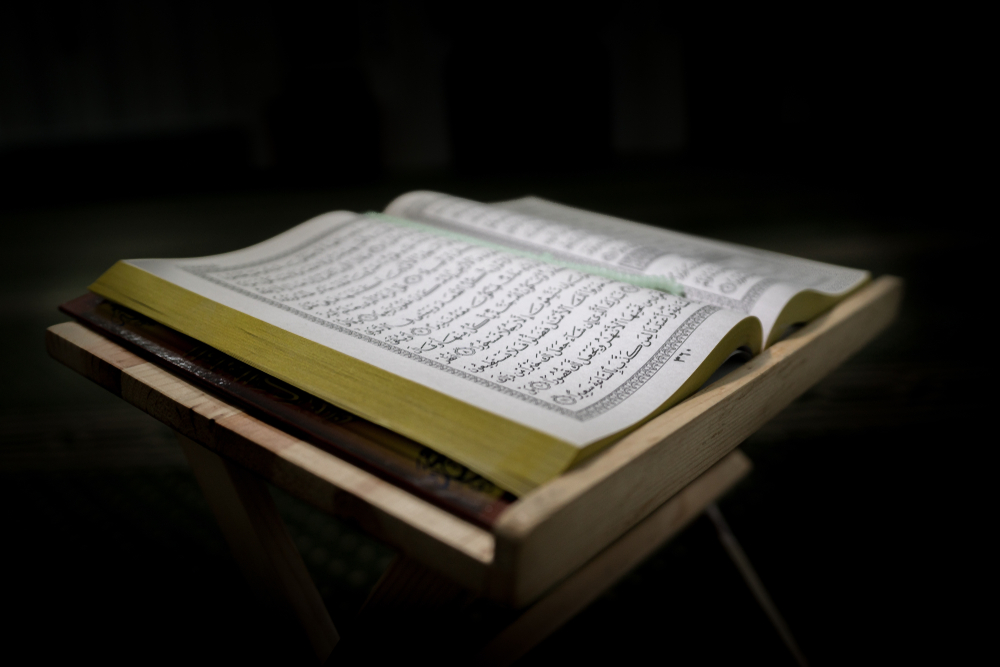Was the Entire Quran Written During the Lifetime of the Messenger of Allah?
Answered by Shaykh Anas al-Musa
Question
Was the entire Quran written during the lifetime of the Messenger of Allah?
Answer
In the name of Allah, the Most Gracious, the Most Merciful.
Yes, the Quran was entirely written during the time of the Messenger of Allah; blessings and peace be upon him. Besides Allah Most High’s collection of the Quran in the heart of the Messenger of Allah, blessings and peace be upon him, as described in: “Do not rush your tongue trying to memorize ˹a revelation of˺ the Quran. It is certainly upon Us to ˹make you˺ memorize and recite it.” [Quran, 75:16-17], the companions of the Messenger of Allah, blessings and peace be upon him, also memorized the Quran.
The instruction of the Messenger of Allah, blessings and peace be upon him, affirms this: “Take the Quran from four: from Ibn Mas‘ud, Ubayy ibn Ka‘b, Mu‘adh ibn Jabal, and Salim, the freed slave of Abu Hudhayfah.” [Bukhari (3597); Muslim (2464)]
Necessity of Writing
However, relying solely on the companions’ memory was not sufficient for preserving the Quran, intended by Allah Most High to be humanity’s guide until the end of time. Except for Allah’s Messengers’, memory is susceptible to human limitations like forgetfulness and misconception.
Thus, writing was an essential means to preserve the sanctity and integrity of Allah’s words; it endures with time and is not lost with the passing of individuals. The Quran indicates the necessity of writing in many places by referring to itself as a ‘book,’ such as: “This is the Book! There is no doubt about it is a guide for those mindful ˹of Allah˺,” [Quran, 2:2] and “Those We have given the Book follow it as it should be followed. It is they who ˹truly˺ believe in it. As for those who reject it, it is they who are the losers.” [Quran, 2:121] This implies that it should be written.
Scribes of the Messenger of Allah
For this purpose, the Messenger of Allah, blessings and peace be upon him, appointed a trusted group of his literate companions, such as ‘Ali ibn Abi Talib, Zayd ibn Thabit, Ubayy ibn Ka‘b, and Mu‘awiya ibn Abi Sufyan, to write down the revelations.
The Messenger of Allah (Allah bless him and give him peace) also generally permitted anyone to write down the Quran. He instructed them to ensure the Quran was not mixed with other texts: “Do not write anything from me except the Quran. Anyone who wrote anything other than the Quran should erase it.” [Muslim (3004); Ahmad (11536)]
Evidences of Quranic Compilation
Evidence of the Quran’s compilation during his era includes his instruction: “Do not travel with the Quran, for I fear that it might fall into the enemy’s hands” [Muslim (1868); Ahmad (4507)], and his letter to Amr ibn Hazm: “None but the pure should touch the Quran.” [Muwatta Malik (234)]
Focus on Memorization and Writing
Initially, the Messenger of Allah, blessings and peace be upon him, and his companions focused on memorizing the Quran. The Messenger of Allah, blessings and peace be upon him, being unlettered, was sent among the unlettered, and writing tools were not readily available. Therefore, reliance was primarily on memorization.
The Arabs, known for memorizing their poetry, lineages, and achievements, prioritized memorization over written records. However, this focus on memorization did not deter the Messenger of Allah, blessings and peace be upon him, and his companions from also documenting and inscribing the Quran, albeit to the extent allowed by the writing means and tools of their time.
Conclusion: Preservation in Hearts and Writing
Thus, the Messenger of Allah (Allah bless him and give him peace) departed this world with the Quran preserved in the hearts of many companions and in written form under his supervision. Allah’s promise stands true: “It is certainly We Who have revealed the Reminder, and it is certainly We Who will preserve it.” [Quran, 15:9]
May Allah’s peace and blessings be upon our Prophet Muhammad, his family, and his companions.
[See: Al-Itqan fi Ulum al-Quran by As-Suyuti, 1.202; Manahil al-Irfan by Al-Zurqani, 1.246; Ulum al-Quran by Dr. Atur p.161; Al-Muharrir fi Ulum al-Quran by Dr. Musaed Al-Tayyar p.150]
[Shaykh] Anas al-Musa
Shaykh Anas al-Musa, born in Hama, Syria, in 1974, is an erudite scholar of notable repute. He graduated from the Engineering Institute in Damascus, where he specialized in General Construction, and Al-Azhar University, Faculty of Usul al-Din, where he specialized in Hadith.
He studied under prominent scholars in Damascus, including Shaykh Abdul Rahman al-Shaghouri and Shaykh Adib al-Kallas, among others. Shaykh Anas has memorized the Quran and is proficient in the ten Mutawatir recitations, having studied under Shaykh Bakri al-Tarabishi and Shaykh Mowfaq ‘Ayun. He also graduated from the Iraqi Hadith School.
He has taught numerous Islamic subjects at Shari‘a institutes in Syria and Turkey. Shaykh Anas has served as an Imam and preacher for over 15 years and is a teacher of the Quran in its various readings and narrations.
Currently, he works as a teacher at SeekersGuidance and is responsible for academic guidance there. He has completed his Master’s degree in Hadith and is now pursuing his Ph.D. in the same field. Shaykh Anas al-Musa is married and resides in Istanbul.
